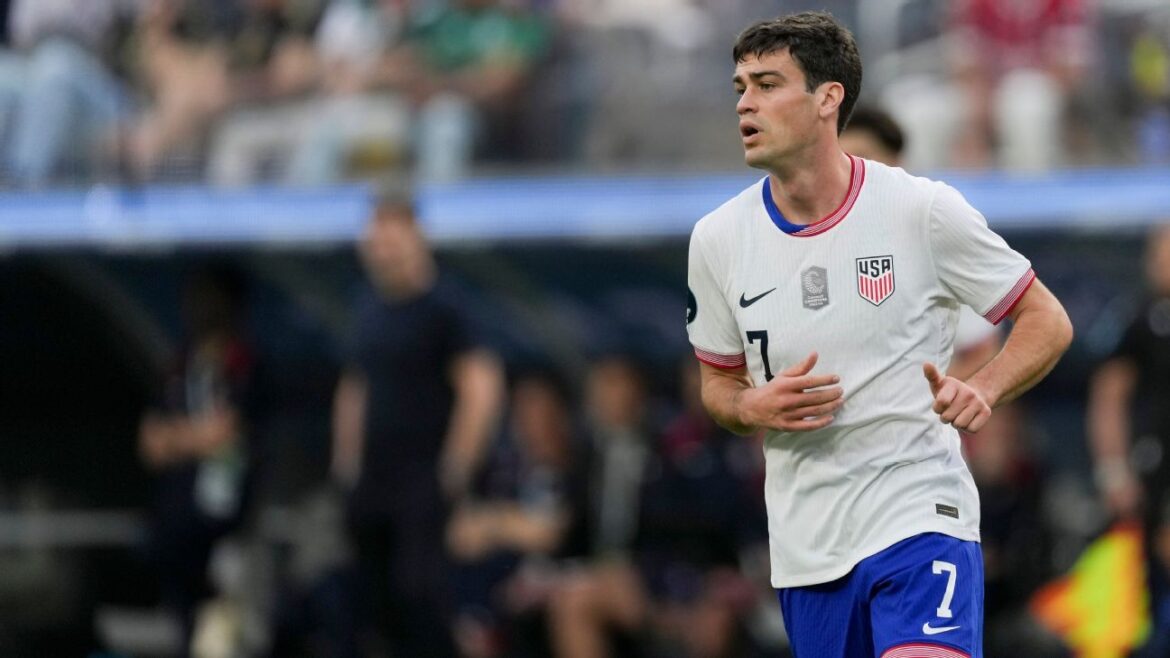From the moment Mauricio Pochettino took over as manager of the U.S. men’s national team, time has been his enemy. He took over with less than two years to go until the U.S. co-hosts the 2026 FIFA World Cup with Canada and Mexico. With no World Cup qualifying, there were few competitive games to observe and assess his roster. Friendlies only get a team so far.
Now, as Pochettino named his roster on Thursday for the November international window, the lack of face time with his squad is being felt more acutely. Injuries have plagued the USMNT almost since the day that Pochettino was appointed, and this roster is no different. Presumed regulars like AC Milan‘s Christian Pulisic, Crystal Palace defender Chris Richards, Fulham‘s Antonee Robinson and Marseille‘s Timothy Weah are out with various ailments.
The same is true for some players pushing for a roster spot, like Vancouver Whitecaps defender Tristan Blackmon, Celtic defender Cameron Carter-Vickers and Club América‘s Alejandro Zendejas.
– USMNT recalls Reyna but Pulisic, McKennie miss out
– Tudor exit means McKennie must prove himself all over again
– Pochettino the player: How his playing days shaped USMNT coach
Juventus‘ Weston McKennie was left off the roster and will have the chance to acclimate himself to new manager Luciano Spalletti. With just one more standalone international window in March, followed by the pre-World Cup get-together sometime in May, there doesn’t appear to be much time left for Pochettino to settle on his best lineup and then — perhaps most importantly — fine-tune things. Pochettino, for his part, insisted he’s not worried.
The core principles have been laid down, and while it perhaps took longer than it should have, the players have adapted to the manager’s expectations. The foundation is such that new arrivals are quickly made aware of what the culture is by those who have had greater exposure to Pochettino’s methods. There is also the realization that the time pressure is largely beyond his control.
“That is the time that we have, and we are not going to complain,” Pochettino said.
“We cannot give excuses to ourselves in case [we don’t] perform. We have enough time. We need to be intelligent, and we need to give our best to perform. It’s up to us.
“I am not worried. I think that is the time that we knew when we signed, and I think [it is] a fact that we suffered too many problems, injuries, players that don’t play too much. That, of course, is difficult, but the thing is we can deal with that, and I think we are going to build a very good roster, very good team that can compete in the best way.”
The good news is that some elements of Pochettino’s squad are healthy again.
PSV Eindhoven striker Ricardo Pepi is back for the first time in almost a year and is fresh off scoring a stoppage-time equalizer against Olympiacos in the UEFA Champions League. The U.S. now has three in-form strikers — AS Monaco‘s Folarin Balogun and Coventry City‘s Haji Wright are the others — to compete for the starting forward spot. That is a situation that the U.S. hasn’t enjoyed for some time.
Sergiño Dest is also back in the fold, after injury and his subsequent recovery prevented him from taking part in the October window. With Orlando City‘s Alex Freeman and Borussia Mönchengladbach defender Joe Scally also called in, the competition should be intense.
Then there is Scally’s club teammate, Gio Reyna, another individual for whom time isn’t an ally. His recent transfer from Borussia Dortmund to Gladbach was supposed to give him a clean slate, but his inability to shake the injury bug that has plagued him for much of his career has meant a stop-start beginning to life with his new club, with just 132 minutes played.
He did get on the field for a 12-minute stint in Gladbach’s 4-0 win over St. Pauli — the club’s first of the season — and Reyna even was involved in the buildup to Oscar Fraulo‘s 80th-minute goal. Reyna was sharp with his other touches and once again provided a tantalizing glimpse of what he can offer on the field.
It was perhaps telling that when Pochettino spoke of Reyna, he initially said, “We already know Gio,” before he immediately clarified his statement, referring to “the potential of Gio and the talent.”
Therein lies the problem. Pochettino knows well that Reyna hasn’t been able to show that talent on the field on a consistent basis. But given the state of the roster, Pochettino is willing to give Reyna a chance, not only to see him play, but to crawl into his psyche and see what makes him tick.
“[Reyna] has enormous talent and it’s true that it’s not playing too much but I think it’s a good opportunity in November, because after March we are not going to be together again,” Pochettino said.
“And to have not too many possibilities to see him again, and to try to share time with him, more than to perform on the pitches. It’s more about to be with him, to share time, to know him better.”
The psychological aspect is clearly important. But Reyna must deliver on the field. With McKennie, Pulisic and Zendejas all absent, and Diego Luna the only other real creative force on the roster, Reyna will never have a clearer lane to playing time and thus make a positive impression on Pochettino than he will in this window.
Whatever time is left, Pochettino, the USMNT and Reyna will all need to make the most of it.
